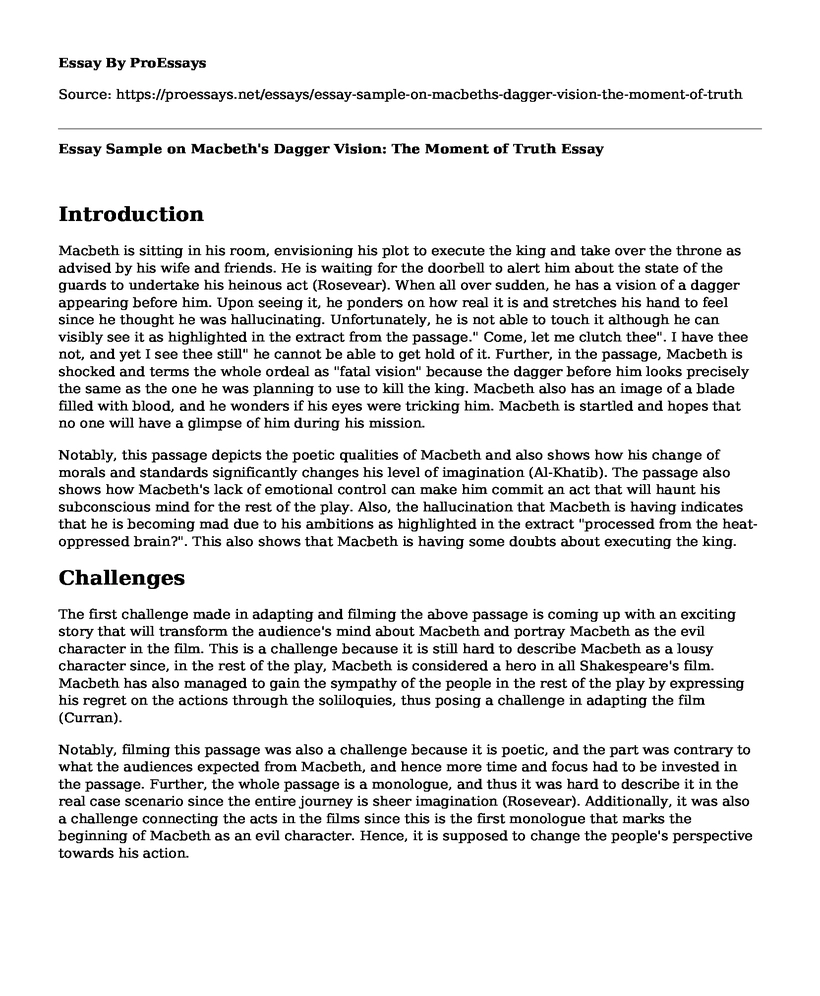Introduction
Macbeth is sitting in his room, envisioning his plot to execute the king and take over the throne as advised by his wife and friends. He is waiting for the doorbell to alert him about the state of the guards to undertake his heinous act (Rosevear). When all over sudden, he has a vision of a dagger appearing before him. Upon seeing it, he ponders on how real it is and stretches his hand to feel since he thought he was hallucinating. Unfortunately, he is not able to touch it although he can visibly see it as highlighted in the extract from the passage." Come, let me clutch thee". I have thee not, and yet I see thee still" he cannot be able to get hold of it. Further, in the passage, Macbeth is shocked and terms the whole ordeal as "fatal vision" because the dagger before him looks precisely the same as the one he was planning to use to kill the king. Macbeth also has an image of a blade filled with blood, and he wonders if his eyes were tricking him. Macbeth is startled and hopes that no one will have a glimpse of him during his mission.
Notably, this passage depicts the poetic qualities of Macbeth and also shows how his change of morals and standards significantly changes his level of imagination (Al-Khatib). The passage also shows how Macbeth's lack of emotional control can make him commit an act that will haunt his subconscious mind for the rest of the play. Also, the hallucination that Macbeth is having indicates that he is becoming mad due to his ambitions as highlighted in the extract "processed from the heat-oppressed brain?". This also shows that Macbeth is having some doubts about executing the king.
Challenges
The first challenge made in adapting and filming the above passage is coming up with an exciting story that will transform the audience's mind about Macbeth and portray Macbeth as the evil character in the film. This is a challenge because it is still hard to describe Macbeth as a lousy character since, in the rest of the play, Macbeth is considered a hero in all Shakespeare's film. Macbeth has also managed to gain the sympathy of the people in the rest of the play by expressing his regret on the actions through the soliloquies, thus posing a challenge in adapting the film (Curran).
Notably, filming this passage was also a challenge because it is poetic, and the part was contrary to what the audiences expected from Macbeth, and hence more time and focus had to be invested in the passage. Further, the whole passage is a monologue, and thus it was hard to describe it in the real case scenario since the entire journey is sheer imagination (Rosevear). Additionally, it was also a challenge connecting the acts in the films since this is the first monologue that marks the beginning of Macbeth as an evil character. Hence, it is supposed to change the people's perspective towards his action.
Creative Choices
The action I had to take is to incorporate some other scenes to convince the audience that Macbeth was not a good character from the beginning. I also had to include the part from the start where Macbeth receives a visit from the three witches who manages to convince him about the throne, thus changing his mind.
Works Cited
Al-Khatib, H. (2016). Piecing out imperfections: Titus Andronicus, the Shakespearean soliloquy, and cognitive literary studies (Doctoral dissertation).
Curran, Kevin. "Feeling criminal in Macbeth." Criticism 54.3 (2012): 391-401.
Kallay, G. Macbeth's Dagger Monologue. Mives semmisigek: Tanulmdnyok Ruttkay Kdlmdn 80. Szulete'snapjdra/Elaborate Trifles: Studies for Kdlmdn G. Ruttkay on His 80th Birthday, 64-81.
Rosevear, Jessica. "From Sound Bites to Sound Learning: Engaging One-Click Kids in Long-Term Study." New Jersey English Journal 2.1 (2013): 9.
Cite this page
Essay Sample on Macbeth's Dagger Vision: The Moment of Truth. (2023, Apr 23). Retrieved from https://proessays.net/essays/essay-sample-on-macbeths-dagger-vision-the-moment-of-truth
If you are the original author of this essay and no longer wish to have it published on the ProEssays website, please click below to request its removal:
- Christianity V. Paganism in Beowulf Essay
- Book Analysis Essay on Animal Farm by George Orwell
- Contrast the Epic of Gilgamesh With the Book of Genesis From the Hebrew Bible Essay
- Princess Project Paper Example
- Essay Example on My Son Blazes Within Me: Exploring Family, Spirituality & More
- Essay Example on Immigrants' Struggle With a Different Culture: Padel and Nagra's Poems
- Mark Twain's Adventures of Huckleberry Finn: A Journey of Pre-War Racism & Dysfunction - Essay Sample







